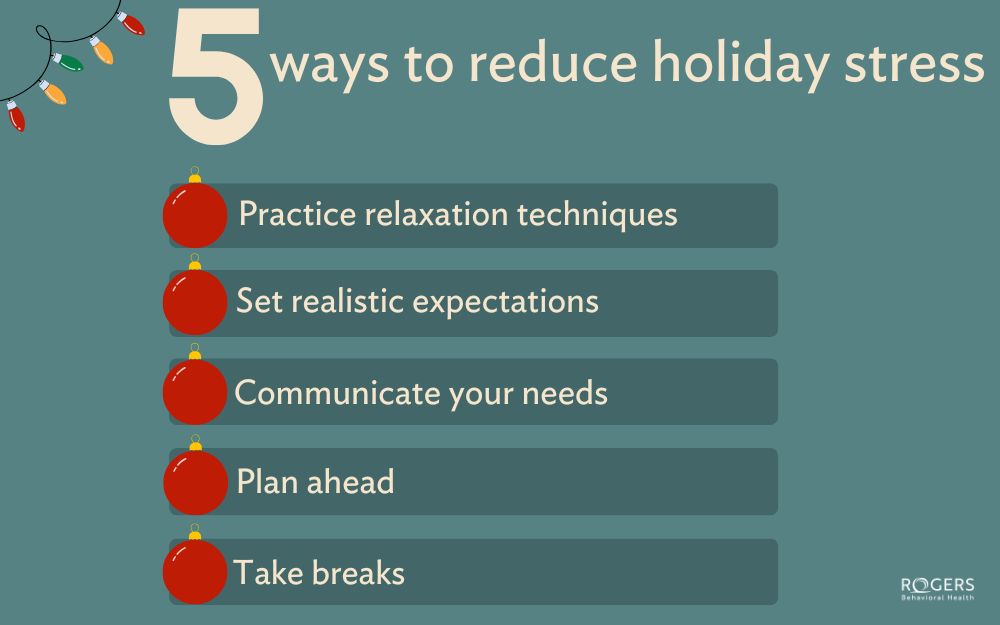Strategies for managing stress during the holiday season
Posted on 11/07/24 09:57:am
Share this article:
By Heather Jones, PhD, vice president of clinical services at Rogers Behavioral Health
Family, and full calendars, not to mention financial strain, can stir up a lot of complex emotions during the holiday season. Rogers Behavioral Health’s Dr. Heather Jones shares valuable insights and strategies to help you keep your peace during this busy time of year.
What are common causes of holiday stress?
People generally feel a lot of pressure during the holiday season—from meeting other’s expectations to living up to the “perfect” holiday pictured in a Hallmark movie or greeting card. Our calendars fill up fast with social obligations, like parties, work gatherings, and community events. Spending time with family members who we don’t often see can bring up unresolved conflicts and difficult emotions. Additionally, for those who have lost a loved one, feelings of grief and loss can be triggered.
Try and identify your personal sources of stress. Pay attention to your physical and emotional reactions. Are you feeling anxious, overwhelmed, or irritable? Are you experiencing physical symptoms, like headaches or stomach aches? By recognizing your stress triggers, you can develop strategies to manage them effectively.
How can I manage holiday stress?
Sometimes when we're anticipating holiday gatherings, we rehearse in our minds all the possible scenarios. There's a lot of perfectionism woven through holiday time and being able to think through what an event could look like and pre-planning, or we sometimes call it pre-coping, can be a really great way to problem solve ahead of time.
There are five basic things we can do leading up to these events to manage any stress or anxiety we might be feeling:
- Practice relaxation techniques: Try deep breathing, meditation, yoga, or spending more time outdoors.
- Set realistic expectations: Don't put too much pressure on yourself to have a perfect holiday.
- Communicate your needs: Be honest with your family and friends about your boundaries and limitations.
- Plan ahead: Decide how you will spend the holidays to reduce uncertainty.
- Take breaks: If you feel overwhelmed, step away from the situation for a few minutes.
How can I set healthy boundaries with family and friends?
Extended family members we don’t often see can get a little personal and ask questions about things that you may not want to share with them. While difficult, it’s important to set boundaries.
- Be assertive: Clearly communicate your needs and boundaries in a respectful manner. You can let your family know you’re going to your aunt’s house for two hours then you’re going to leave because you have other obligations. Proactively communicating boundaries ahead of time is often helpful.
- Prioritize self-care: Make time for activities that help you relax and recharge. Additionally, maintain basic-self-care:
- Get enough sleep: Aim for 7-9 hours of sleep per night
- Eat a healthy diet: Avoid excessive sugar and alcohol intake.
- Exercise regularly: Physical activity can help reduce stress and improve mood.
- Practice mindfulness: Pay attention to the present moment and avoid dwelling on the past or future.
- Spend time in nature: Connecting with nature can be a great way to reduce stress.
- Avoid overcommitting: Don't feel obligated to attend every event or gathering or stay the entire time.
- Practice saying no: It's okay to decline invitations if you're feeling overwhelmed.
How can I manage feelings of grief or loss that resurface during the holidays?
The holiday season reminds us of people we love who are no longer with us which can trigger intense feelings of sadness and grief. Instead of looking for ways to alleviate those feelings, acknowledge them and honor your loss and grief. It’s okay to feel sad during the holidays. Make sure to seek support from friends, family, or a therapist, and consider creating new traditions that will honor your loved one.
How can I stay present during such a busy time of year?
While the hustle and bustle of the holidays can leave us feeling frazzled and distracted, all of us want to make the most of the time we have celebrating with our loved ones.
To help us stay in the present moment, I recommend:
- Set your phone down. I think there are many times when we’re gathering together in community and everyone is sitting in a room together, scrolling through their phones.
- Have a mix of planned and unplanned activity. Create lists of things that you can do as a family while also letting the day take you where it will.
- Mindful breathing: Focus on your breath and bring your attention back to the present moment.
- Grounding techniques: Engage your senses to connect with the present moment, such as noticing the sounds, sights, smells, tastes, and sensations around you.
- Mindfulness meditation: Practice mindfulness meditation to cultivate awareness and reduce stress.
Show up, practice gratitude, be present and available, then go home early and get sufficient sleep. Keep in mind that everyone is doing the best they can every moment of the day. Spending time together and taking care of each other is the most important thing.
You can hear more from Dr. Jones on our Rise Above podcast by clicking here.
Rogers offers compassionate care
If you or a loved one is struggling with mental health or addiction, our compassionate teams are here to help. Call 800-767-4411 for a free, confidential screening.



